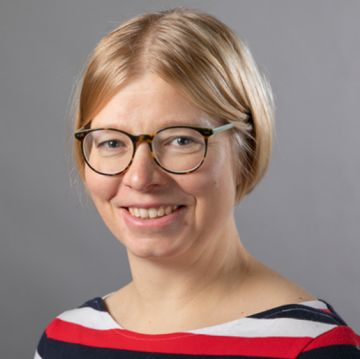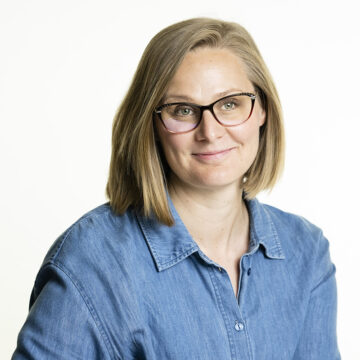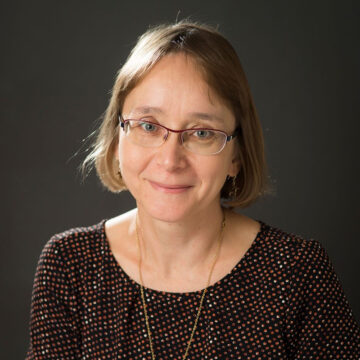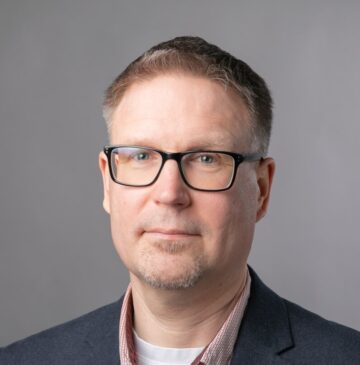Researchers
 Veronika Laippala is professor of digital language studies and one of the senior members of TurkuNLP at the University of Turku. Her research combines text linguistics and language technology from different perspectives, and she has contributed to the development of the widely used language technology resources for Finnish, such as Universal dependencies Finnish. In her recent research, Laippala has focused on genre (or register) identification and analysis in different languages. In this project, she also focuses on genres and the computational analysis of the data. ORCID: https://orcid.org/0000-0002-7635-429X
Veronika Laippala is professor of digital language studies and one of the senior members of TurkuNLP at the University of Turku. Her research combines text linguistics and language technology from different perspectives, and she has contributed to the development of the widely used language technology resources for Finnish, such as Universal dependencies Finnish. In her recent research, Laippala has focused on genre (or register) identification and analysis in different languages. In this project, she also focuses on genres and the computational analysis of the data. ORCID: https://orcid.org/0000-0002-7635-429X
 Lotta Leiwo, a collaborator on the project, is a Doctoral Researcher at the University of Helsinki. Leiwo studies weather writings in hisrorical newspapers and Finnish migrant-settler women in the early 20th-century U.S. In her dissertation in Folklore Studies, she examines the political role of Finnish women in the socialist movement, historical understandings of weather and climate, and their entanglements with settler colonialism. Her research interests span the intersections of women’s history, the cultural history of climate, labor history, historical newspapers, and everyday settler colonialism. Prior to her dissertation project, Leiwo worked as the research assistant in the international project titled “T-Bone Slim and the transnational poetics of the migrant left in North America.” ORCID: https://orcid.org/0000-0001-9927-1000
Lotta Leiwo, a collaborator on the project, is a Doctoral Researcher at the University of Helsinki. Leiwo studies weather writings in hisrorical newspapers and Finnish migrant-settler women in the early 20th-century U.S. In her dissertation in Folklore Studies, she examines the political role of Finnish women in the socialist movement, historical understandings of weather and climate, and their entanglements with settler colonialism. Her research interests span the intersections of women’s history, the cultural history of climate, labor history, historical newspapers, and everyday settler colonialism. Prior to her dissertation project, Leiwo worked as the research assistant in the international project titled “T-Bone Slim and the transnational poetics of the migrant left in North America.” ORCID: https://orcid.org/0000-0001-9927-1000
 Johanna Lilja, the Director of Services in the Research Library at the National Library, is responsible for the project at the National Library. She defended her thesis at the University of Tampere in Information Studies and Interactive Media. Her academic papers focus on the history of scholarly publishing. Additionally, she has written articles and blogs on open access publishing, digitization of cultural heritage, and research infrastructures. She is also a member of the board of the FIN-CLARIAH consortium.
Johanna Lilja, the Director of Services in the Research Library at the National Library, is responsible for the project at the National Library. She defended her thesis at the University of Tampere in Information Studies and Interactive Media. Her academic papers focus on the history of scholarly publishing. Additionally, she has written articles and blogs on open access publishing, digitization of cultural heritage, and research infrastructures. She is also a member of the board of the FIN-CLARIAH consortium.
 Petri Paju is a researcher in cultural history at the University of Turku, where he is also an associate professor (title of docent) in the cultural history of technology. He has solid experience in studying newspaper materials, and in doing transnational history and digital history. Together with colleagues (Mats Fridlund and Mila Oiva), he is the co-editor of the open access book Digital histories: emergent approaches within the new digital history (Helsinki University Press 2020). He has worked on transnational textual reuse for example in a Finnish-Swedish research project that published the open access book Information Flows across the Baltic Sea: Towards a Computational Approach to Media History (eds. Patrik Lundell, Hannu Salmi, Erik Edoff, Jani Marjanen, Petri Paju and Heli Rantala) (Mediehistoriskt arkiv, Lund 2023.) In that project, one of his continuing research interests was the widespread and colourful advertising of patent medicines in different countries. ORCID: https://orcid.org/0000-0002-2486-2364
Petri Paju is a researcher in cultural history at the University of Turku, where he is also an associate professor (title of docent) in the cultural history of technology. He has solid experience in studying newspaper materials, and in doing transnational history and digital history. Together with colleagues (Mats Fridlund and Mila Oiva), he is the co-editor of the open access book Digital histories: emergent approaches within the new digital history (Helsinki University Press 2020). He has worked on transnational textual reuse for example in a Finnish-Swedish research project that published the open access book Information Flows across the Baltic Sea: Towards a Computational Approach to Media History (eds. Patrik Lundell, Hannu Salmi, Erik Edoff, Jani Marjanen, Petri Paju and Heli Rantala) (Mediehistoriskt arkiv, Lund 2023.) In that project, one of his continuing research interests was the widespread and colourful advertising of patent medicines in different countries. ORCID: https://orcid.org/0000-0002-2486-2364
 Hannu Salmi is Professor of Cultural History at the University of Turku and the PI of the Project Imagined Homelands. He has written extensively on nineteenth- and twentieth-century history, especially on media history and digital history, for example the books Nineteenth-Century Europe: A Cultural History (Polity, 2008) and What is Digital History? (Polity, 2020). He has led several research projects on digital history, including Computational History and the Transformation of Public Discourse in Finland, 1640–1910 (Academy of Finland, 2016–2019) and Informationsflöden över Östersjön: Svenskspråkig press som kulturförmedlare 1771–1918 (Society for Swedish Literature in Finland, 2020–2024). He was also the Finnish PI of the Project Oceanic Exchanges: Tracing Global Information Networks In Historical Newspaper Repositories, 1840–1914 (Trans-Atlantic Platform, 2017–2019). ORCID: https://orcid.org/0000-0001-8607-6126
Hannu Salmi is Professor of Cultural History at the University of Turku and the PI of the Project Imagined Homelands. He has written extensively on nineteenth- and twentieth-century history, especially on media history and digital history, for example the books Nineteenth-Century Europe: A Cultural History (Polity, 2008) and What is Digital History? (Polity, 2020). He has led several research projects on digital history, including Computational History and the Transformation of Public Discourse in Finland, 1640–1910 (Academy of Finland, 2016–2019) and Informationsflöden över Östersjön: Svenskspråkig press som kulturförmedlare 1771–1918 (Society for Swedish Literature in Finland, 2020–2024). He was also the Finnish PI of the Project Oceanic Exchanges: Tracing Global Information Networks In Historical Newspaper Repositories, 1840–1914 (Trans-Atlantic Platform, 2017–2019). ORCID: https://orcid.org/0000-0001-8607-6126
 Kirsti Salmi-Niklander (Senior Lecturer emerita in Folklore Studies, University of Helsinki) has done long-term research on oral-literary traditions, working-class culture, and handwritten newspapers as an alternative medium, both in Finland and in Finnish immigrant communities in North America. She was PI in the research and artistic project “T-Bone Slim and the Transnational Poetics of the Migrant Left in North America” (Kone Foundation 2022 – 2023). In this project Kirsti Salmi-Niklander will explore the interaction of printed and handwritten newspapers in Finnish migrant communities. ORCID: https://orcid.org/0000-0003-0552-1801
Kirsti Salmi-Niklander (Senior Lecturer emerita in Folklore Studies, University of Helsinki) has done long-term research on oral-literary traditions, working-class culture, and handwritten newspapers as an alternative medium, both in Finland and in Finnish immigrant communities in North America. She was PI in the research and artistic project “T-Bone Slim and the Transnational Poetics of the Migrant Left in North America” (Kone Foundation 2022 – 2023). In this project Kirsti Salmi-Niklander will explore the interaction of printed and handwritten newspapers in Finnish migrant communities. ORCID: https://orcid.org/0000-0003-0552-1801
 Valtteri Skantsi is a doctoral researcher at the University of Oulu, and a part of the TurkuNLP research group. In his doctoral thesis, Fennistic language technology – data, methods and possibilities, Skantsi studies what kinds of technological methods are being used in managing the data of Finnish language research, and what kinds of methods could be used in the future. Fennistic relies on a very traditional way of collecting and processing the research data. With the different pieces of research in his dissertation, Skantsi aims to bring new, technologically aided ways of data collection and processing in the field of Fennistic, while also deepening the cross-disciplinary cooperation. He has carried out the morphological annotation process and error-coding of an ICLFI corpus consisting of a million words, and register-annotated most of the FinCORE corpus consisting of over seven million words. He has also studied both corpora in his publications. ORCID: https://orcid.org/0000-0002-1230-9983
Valtteri Skantsi is a doctoral researcher at the University of Oulu, and a part of the TurkuNLP research group. In his doctoral thesis, Fennistic language technology – data, methods and possibilities, Skantsi studies what kinds of technological methods are being used in managing the data of Finnish language research, and what kinds of methods could be used in the future. Fennistic relies on a very traditional way of collecting and processing the research data. With the different pieces of research in his dissertation, Skantsi aims to bring new, technologically aided ways of data collection and processing in the field of Fennistic, while also deepening the cross-disciplinary cooperation. He has carried out the morphological annotation process and error-coding of an ICLFI corpus consisting of a million words, and register-annotated most of the FinCORE corpus consisting of over seven million words. He has also studied both corpora in his publications. ORCID: https://orcid.org/0000-0002-1230-9983